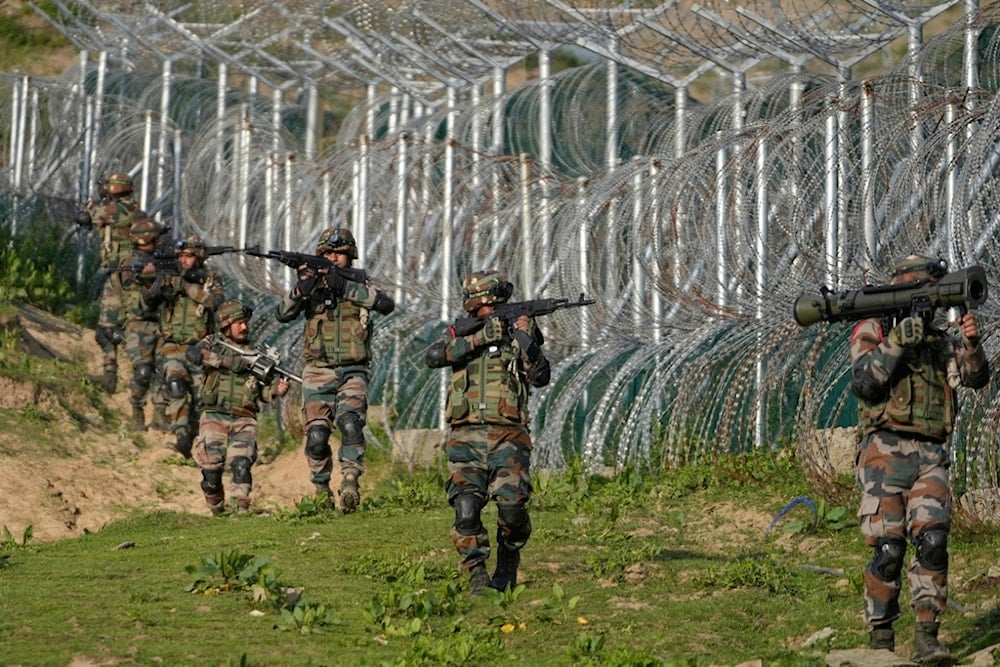Pakistan, India near pre-conflict troop levels along border: General
Pakistan’s top military official says India and Pakistan are scaling back troops after intense border clashes in April.
-

Indian army soldiers display a military drill along the line of control between India and Pakistan during a media tour somewhere north of Indian-controlled Kashmir, on Monday, May 19, 2025 (AP Photo/Mukhtar Khan)
India and Pakistan are reducing the military buildup along their shared border, returning to pre-conflict levels following the most intense clashes in decades, according to Pakistan’s top military official.
General Sahir Shamshad Mirza, chairman of Pakistan’s Joint Chiefs of Staff, told Reuters on Friday that the drawdown is underway after both countries deployed fighter jets, missiles, drones, and artillery in four days of fighting that began in late April.
“We have almost come back to the pre-22nd April situation... we are approaching that, or we must have approached that by now,” said Mirza, speaking from the Shangri-La Dialogue in Singapore.
The conflict was triggered by an April 22 attack in Indian-controlled Kashmir that killed 26 people, mostly tourists. India blamed the attack on “terrorists” allegedly backed by Pakistan, a charge denied by Islamabad.
On May 7, India launched missile strikes on what it called “terrorist infrastructure” across the border. Pakistan responded with retaliatory attacks, leading both nations to reinforce troops along the frontier.
Risk of strategic miscalculation present
While Mirza confirmed that there was no movement toward nuclear deployment during the fighting, he warned that the risk of miscalculation remains dangerously high.
"Nothing happened this time," he said. "But you can't rule out any strategic miscalculation at any time, because when the crisis is on, the responses are different."
The Pakistani general emphasized that this conflict extended beyond Kashmir and struck mainland targets in both countries.
Read more: India and Pakistan trade accusations over nuclear arsenal safety
'Very dangerous trend'
“This is a very dangerous trend,” Mirza underscored, warning that future escalations may not remain confined to disputed territories and they "would come down to (the) whole of India and (the) whole of Pakistan."
He also cautioned that international mediation could become increasingly difficult due to a lack of crisis management mechanisms between the two countries.
"The time window for the international community to intervene would now be very less, and I would say that damage and destruction may take place even before that time window is exploited by the international community," he explained.
Read more: India threatens Pakistan’s water supply with Indus river project plans
India maintains hard line
Despite Pakistan’s openness to dialogue, Mirza noted that no backchannel or informal talks were currently underway, and there were no plans to meet with India’s Chief of Defence Staff General Anil Chauhan at the Singapore forum.
India has maintained a hard line. Defense Minister Rajnath Singh stressed that “if there are talks, it will only be on terrorism and [Pakistan-controlled Kashmir]. If Pakistan is serious about talks, it should hand over terrorists...to India so that justice is served.”
Mirza countered that military conflict cannot resolve core issues between the two nuclear-armed neighbors.
“These issues can only be resolved by dialogue and consultations, on the table,” he indicated. “They cannot be resolved on the battlefield.”
Read more: Timeline of India-Pakistan conflicts: 1947 partition - 2025's Pahalgam

 3 Min Read
3 Min Read










